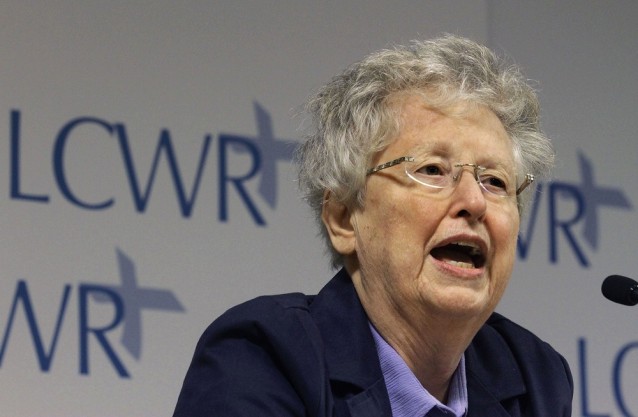The Leadership Conference of Women Religious has been charged by Cardinal Mueller, prefect of the Congregation for the Doctrine of the Faith, with failing to submit to oversight from the Vatican about how they should go about organizing their annual conferences. The real issues at stake are much deeper and go to the heart of what Christian theology is and who gets to do it. On Mother’s Day, I want to reflect on the women who have raised their voices and offered their lives as witness to the living God.
Mueller’s remarks are from an April 30 meeting at the Vatican that included leaders of the LCWR and members of the CDF. Mueller expresses particular concern about the LCWR’s choice of speakers (this year, Fordham theologian Elizabeth Johnson will give the keynote address) and the attention given to the concept of Conscious Evolution discussed by Barbara Marx Hubbard, a previous keynote speaker. Mueller claims that the “fundamental theses of Conscious Evolution are opposed to Christian Revelation and, when taken unreflectively, lead almost necessarily to fundamental errors regarding the omnipotence of God, the Incarnation of Christ, the reality of Original Sin, the necessity of salvation and the definitive nature of the salvific action of Christ in the Paschal Mystery.” He says that it “saddens” him to know that “a theologian criticized by the Bishops of the United States because of the gravity of the doctrinal errors in that theologian’s writings” is to be given the conference’s leadership award.
German theologian Walter Kasper tried to downplay Mueller’s critique, saying that he, along with many other theologians in the history of the church, has been criticized, so Johnson “is in good company.” He expressed hope for ongoing dialogue:
“If you have a problem with the leadership of the women’s orders, then you have to have a discussion with them, you have to dialogue with them, an exchange of ideas,” he said. “Perhaps they have to change something. Perhaps also the Congregation (for the Doctrine of the Faith) has a little bit to change its mind. That’s the normal way of doing things in the church. I am for dialogue. Dialogue presupposes different positions. The church is not a monolithic unity.”
But of course, dialogue is difficult when one side has ultimate authority over the other. Emily Baxter at ThinkProgress.org, writes:
. . . the sisters of the LCWR are — whether they call themselves feminist or not, prophetic or not, radical or not — the voice of women struggling for respect and some mote of equality within (arguably) the oldest patriarchal institution in the world. Unlike Cardinal Kasper, they’ve been told that the recognition of their organization and way of life could depend on toeing the line.
The sisters of the LCWR are not theologians, but they are doing theology, and they are doing it prophetically. The average age in the group is “between 73 and 74.” At the time when most of them would have been discerning their vocations, theology was not really open to women. There were a few exceptions (Elizabeth Johnson, Margaret Farley, Anne Patrick, Elizabeth Schussler Fiorenza, Rosemary Radford Ruether), but the vast majority of theologians were celibate men. And yet, in lives devoted to Christian faith, community, and service, these women developed ways of looking at the world theologically. The popularity they now enjoy has everything to do with the fact that laypeople see their commitment and the way they look at everything they do with a Christological lens. Most cannot imagine that these women are simply “in error.”
Instead, many find women’s perspectives on theology to be life-giving. In an article about “What Women Theologians Have Done for the Church,” Heather Grennan Gary quotes Notre Dame professor Kathleen Sprows Cummings, who tells about a friend’s reaction to a lecture by Elizabeth Johnson:
“I always had a problem with Mary and I didn’t know what it was,” she told Cummings, referring to the obedient, virginal, domestic lady in blue that had been her image of Mary until that night. Johnson shattered that image, and replaced it with the image of a spirited, scandalous, prophetic, poor, liberated, and joyful refugee: “This is a Mary I can live with.”
Toward the end of the questioning, Boston’s Cardinal Bernard Law slammed shut his binder of Johnson’s writings and scoffed, “You mostly teach Christology. You’re not going to do anymore of this feminist stuff.” He pushed the files away.




Beautifully said! I would add also our foremothers–from Mary Magdalene to Teresa of Avila to Catherine LaCugna, and colleagues and mentors who’ve helped us along, those you’ve named and all the others too numerous to list. Here at JST-SCU, Sandra Schneiders and Mary Ann Donovan have created a powerful legacy…
Many of my favourite mentors, theologians and theology professors have been women. When I was a seminarian in Canada, we were always encouraged to engage with people who might offer a different view of theology from various perspectives. In Canada where I went to school and later at Saint Mary’s in Winona, dialogue was the norm. Rome needs to understand that honest dialogue is freeing and uplifting. Thanks for the article.
Thank you, Julie. I am grateful to so many women mentors over the years. Sisters of Loretto were wonderful teachers during my elementary and high school years. Women like Dorothy Day and Rosemary Haughton have challenged me and deepened faith. Annie Dillard, Mary Karr, Marie Ponsot, and Alice McDermott are my kind of theologian. And my litany of praise and thanksgiving would include outsiders like Simone Weil, A. G. Mojtabai, Katharine Butler Hathaway, and Emily Dickinson.
Thanks Julie–we are grateful for our daughters too! You make our lifetimes of reading, writing, praying, teaching, learning and hoping worthwhile. Lisa